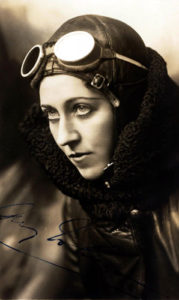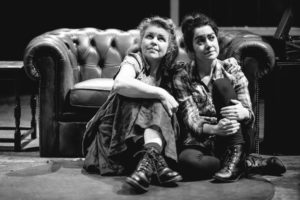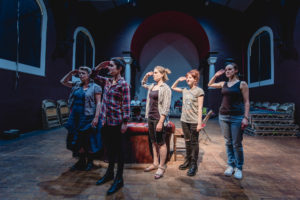
In the RAF Museum, London, the most prominent female presence is a cut-out figure of Captain Rosemary Rees (Lady de Vos), one of the original eight members of the Air Traffic Auxiliary, founded by Gerald d’Erlanger and the intrepid and formidably well-connected 29-year-old Pauline Gower, which is in turn represented by a low-key information board in a neighbouring gallery. In her autobiography, Rees commented that members of the younger generations would be mildly interested when they found out that she flew planes during the war but would shut down the conversation once they found out that she didn’t fight and her job ‘only’ involved maintenance and moving the aircraft around.
A huge amount of glamour was attached to the status of being part of the RAF – apparently airmen were considered the most desirable strand of the forces as boyfriends – but in order for such victories to be possible, highly complex logistics executed with the utmost precision were imperative. This band of civilians, consisting of men who didn’t meet the RAF’s requirements and women, lived by the philosophy that they should be able to fly any kind of plane unseen, they took as many risks as the fighter pilots and a number died carrying out their mission, including female flying pioneer and national treasure Amy Johnson. If a man destroyed a plane, it would be considered unfortunate, if a woman did so, her entire sex would be tainted by association.

ATA women were featured in the press as highly aspirational figures, having grown up during the golden age of recreational flying when the American Amelia Earhart and the British Amy Johnson were adventurous, independent role models for interwar women. Many members of the ATA came from wealthy backgrounds and owned their own planes, allowing them to jet off to Europe for the weekend, giving their friends and lovers a ride. Rosemary Rees’s father was a Conservative MP who was unusually open-minded about his daughter pursuing a career as a dancer in revues; she was introduced to the idea of learning to fly by her brother’s friend Gordon Selfridge Jr, and when she had to choose between dancing and flying, she chose the latter. Mary Ellis, daughter of an Oxfordshire farmer, was less privileged but as a neighbour of the Mitford sisters, would sometimes get a lift in their car.
In Airwomen’s Work, a prospectus for women thinking about entering the ATA, Leonard Taylor questioned whether or not was a good thing that the world was moving toward greater equality between the sexes but conceded that ‘with every advance in civilisation, women grow in beauty and charm, and that it was necessary for everyone to roll up their sleeves for the war effort. Furthermore, the ATA’s work was no more physically unfeminine than the work undertaken by domestic servants, nor was mechanical work too difficult as ‘Any woman who can keep a complicated kitchen in order can look after a car.’

This kind of paternalism was also seen in the fight for the right to wear trousers. ‘Pop’ d’Erlanger didn’t approve of women in trousers and requested that they change before disembarking but had to give in when they argued that to do so on tarmac would be unseemly. In the selection of memoirs that I have read, it’s notable how the women don’t talk about how they fought for and achieved equal pay with their male ATA colleagues in 1943. Diana Barnato Walker, daughter of a millionaire who received a Bentley for her 21st birthday and attended her ATA exam in a leopard-skin coat, breezily recalled that of course the women didn’t earn as much as the men, but they didn’t really care because the opportunities to fly state-of-the-art aircraft was payment in itself. Perhaps thinking about money many years after the events took place felt somehow tawdry but it nevertheless represented a considerable landmark.
For every dashing Group Captain Peter Townsend, there was a team of civilians making sure that the planes were ready for battle. Bringing the skill and courage of these women centre stage is something that they richly deserve, their remarkable achievements all the more extraordinary in a war and a world designed for men.

Spitfire Sisters ends 6th July